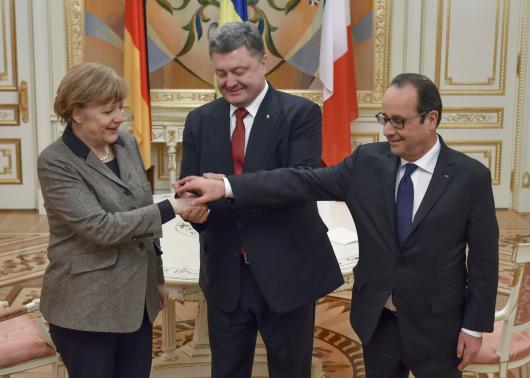German, French leaders take Ukraine peace plan to Moscow

(Reuters) - The leaders of Germany and France announced a new peace plan for Ukraine on Thursday, flying to Kiev with a proposal they would then take on to Moscow.
The coordinated trip by Chancellor Angela Merkel and President Francois Hollande comes as rebels advanced on a railway hub held by Ukrainian troops after launching an offensive that scuppered a five-month-old ceasefire.
The importance of reaching a deal was demonstrated by a dramatic collapse in Ukraine's hryvnia currency, which lost nearly a third of its value after the central bank halted daily auctions at which it sold hard currency to banks.
With Washington moving toward a decision soon on arming Ukraine, U.S. Secretary of State John Kerry also visited Kiev on Thursday. He had no plans to go to Moscow and was not involved in the Franco-German initiative, although he supported it.
Moscow said it hoped talks with Merkel and Hollande would be "constructive".
German government sources said the key problem for resuming peace talks was that the current front line no longer tallies with what was agreed at talks in Minsk, Belarus, last year. One idea was that a new attempt at a ceasefire should take in the current front line, which reflects rebel gains.
For talks to begin anew, Kiev would have to accept that the separatists now control several hundred square kilometers more than agreed in Minsk -- without Kiev having to give up its claim to these areas as part of the Ukrainian state.
In the end, the goal of the peace process should be the restoration of Ukraine’s territorial integrity, the sources said.
Ukrainian Prime Minister Arseny Yatseniuk said Kiev would not consider any peace plan that casts doubt on the nation's territorial integrity, sovereignty or independence.
The Franco-German plan looks like an eleventh-hour bid to halt the escalation of the conflict ahead of diplomatic deadlines likely to make east-west confrontation even worse.
Peace talks collapsed on Saturday in Belarus and EU leaders are expected to consider new sanctions against Moscow next week.
"Together with Angela Merkel we have decided to take a new initiative," Hollande told a news conference. "We will make a new proposal to solve the conflict which will be based on Ukraine's territorial integrity."
He and Merkel met President Petro Poroshenko in Kiev on Thursday and were expected to go to Moscow to see Russia's Vladimir Putin on Friday.
Poroshenko said the talks "gave hope that there will be a result in a ceasefire”, his office said in a statement.
Hollande said earlier: "For several days Angela Merkel and I have worked on a text ... a text that can be acceptable to all."
German Foreign Minister Frank-Walter Steinmeier played down the prospect of a breakthrough: "I don't want to talk about the chances (of success). At this stage there is hope, rather than chances."
NATO says Russia has sent weapons, funds and troops to assist the rebel advance, negating a ceasefire in eastern Ukraine where war has already killed more than 5,000.
Moscow denies involvement in fighting for territory the Kremlin now calls "New Russia".
LETHAL WEAPONS
Speaking after meeting Poroshenko in Kiev, Kerry said Washington supported diplomacy, but would "not close our eyes" to Russian tanks and troops crossing the border.
"We are not seeking a confrontation with Russia. No-one is," Kerry said. "We are very hopeful that Russia will take advantage of our broad-based, uniform acceptance of the notion that there is a diplomatic solution staring everybody in the face. That is what we want.”
U.S. President Barack Obama will decide soon whether to provide Ukraine with lethal weapons to fight the separatists, Kerry said.
In Washington, Republican Senator John McCain said U.S. lawmakers would write legislation requiring the United States to send arms to Ukraine if Obama does not do so. But European defense ministers meeting in Brussels opposed sending arms, suggesting a transatlantic split over the issue.
Moscow said it would consider any U.S. arms sent to Kiev to be a security threat.
Ukraine's Poroshenko told a German newspaper it was time for NATO to send "modern weapons for protection and for resisting the aggressor."
The rebels have been concentrating on Debaltseve, a rail hub where a government garrison has held out despite being nearly encircled.
On Wednesday, the rebels appeared to have captured Vuhlehirsk, a nearby small town where government troops had also been holding out. The army said it was still contesting the town, but Reuters journalists saw no sign of areas under army control. Four dead Ukrainian soldiers lay in a garden.
"Someone should come to remove these corpses, it is inhumane to leave them here to rot," said Sergey Kopun, 50, a metal worker, emerging from a cellar where he had been sheltering with his wife and quadriplegic mother from days of fighting.
War and corruption have nearly bankrupted Ukraine, and Western sanctions and falling oil prices have also hurt Russia.
But Ukraine is by far the poorer of the two, and the collapse in the hryvnia was stunning. The central bank auctions scrapped on Thursday had enabled banks to set a value for the hryvnia, and without them traders had trouble finding a floor. A dramatic hike in the main interest rate to 19.5 percent from 14 percent did nothing to stop the plunge.







